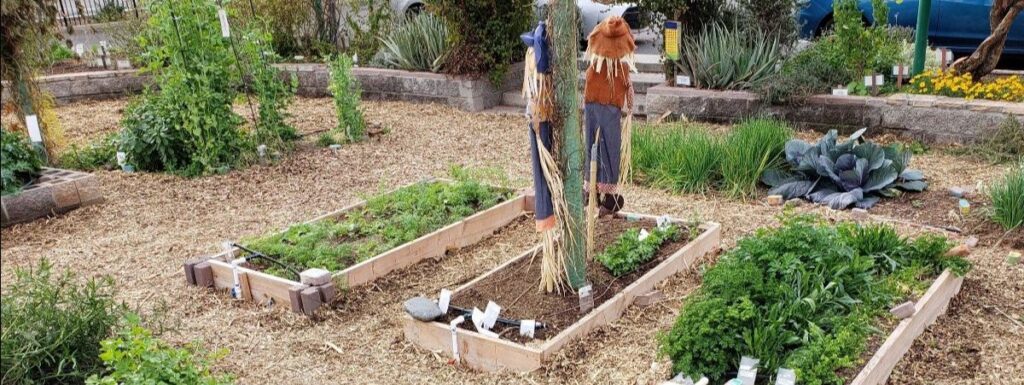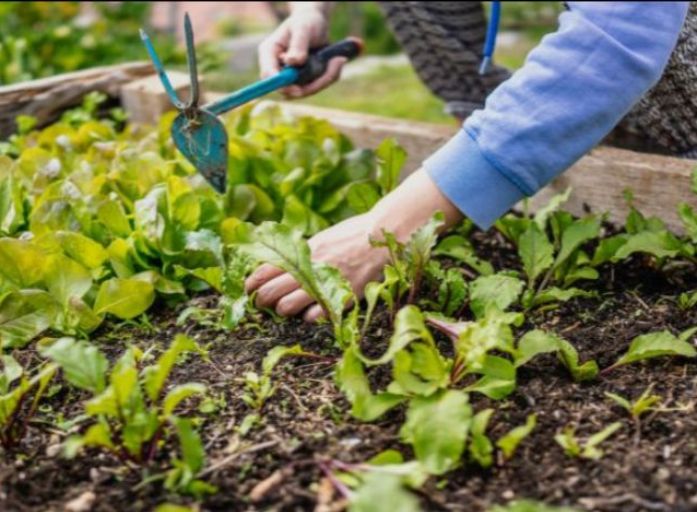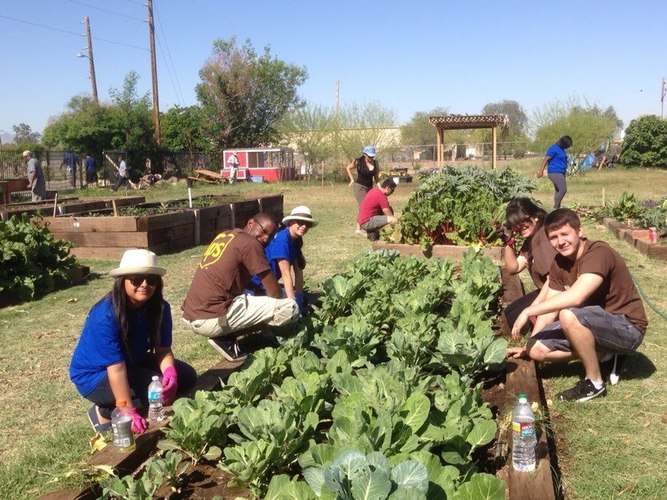Three Rivers Agricultural Land Initiative (TRALI)
The Arizona Community Land Trust (AzCLT) is a relatively new community land trust (CLT) which has as one of its goals, the preservation of agricultural lands in Maricopa County for the growing of food. As a new organization, AzCLT looks for other CLTs with a similar goal to learn how they have been successful. Recently AzCLT was introduced to Marisa Manheim who is now a Ph.D. student in Sustainability at Arizona State University. Previously she played a role in establishing the Three Rivers Agricultural Land Initiative (TRALI) in Pittsburgh, Pennsylvania. AzCLT has taken this opportunity to learn more about the successes of the TRALI and how those successes might be used to start a similar process in Maricopa County.
Marisa Manheim spent 8 years leading community projects and policy for Grow Pittsburgh, an urban agriculture nonprofit. Pittsburgh has always been vibrant with urban agriculture, but after the collapse of the steel industry in the late 1970s, urban farms and community gardens proliferated. Most of these locations were lost in the subsequent years and, despite the 27,000 vacant lots inside the city limits, getting access to land was a huge challenge for growers when the urban farming interest renewed during the Great Recession. Grow Pittsburgh experienced this firsthand working with residents surrounded by abandoned empty lots who could not get legal access to any land for starting a much-needed community garden. Even those fortunate to garden or farm on city-owned or nonprofit owned properties feared being displaced if the city or nonprofit board decided to develop the land.
After several years of research and discussions with community gardeners and urban farmers, Grow Pittsburgh sought a way to streamline land access and protect the investment of labor and funds residents put towards improving these lots, as well as the food system resiliency these sites provided. At the same time, the organization was cognizant of the resident displacement and gentrification that can occur when urban agriculture projects start up. For two years, the organization worked with local affordable housing and greenspace organizations to establish an umbrella land trust that would work in concert to preserve open space, urban farms, and affordable housing in the regions’ neighborhoods. While this larger vision has yet to come to fruition, it did lead to a much greater awareness in the Pittsburgh area of the potential of the community land trust model, including incorporating preference for community land trusts in land banking legislation in Pittsburgh and Allegheny County.
The two greenspace organizations involved in the umbrella CLT effort, Grow Pittsburgh and the Allegheny Land Trust, spun off from this larger initiative to form the Three Rivers Agricultural Land Initiative (TRALI). The basic framework of the partnership was laid out with a technical assistance grant from Grounded Solutions Network. TRALI officially launched in August 2017 and seated its first steering committee soon after. It has already acquired two (three?) important urban agriculture properties in Pittsburgh.

What expertise does each partner – Grow Pittsburgh; Allegheny Land Trust – bring to the Initiative?
Following is an overview of each organizations and more details of the Three Rivers Agricultural Land Initiative.
Grow Pittsburgh – https://www.growpittsburgh.org/about-us
Grow Pittsburgh’s mission is to teach people how to grow food and promote the benefits that gardens bring to our neighborhoods. Founded in 2005 by three urban farmers, Grow Pittsburgh has grown and adapted its programs over the years to meet the changing landscape and community-identified needs and priorities for growing food in Pittsburgh neighborhoods.
Grow Pittsburgh builds and supports school and community gardens by working with novice groups who have dreams of starting a garden, as well as with established school and community gardeners who are looking for additional resources or trainings to make their garden programs more sustainable. Over the past 10 years, Grow Pittsburgh has started 38 thriving community gardens, and supported more with tools, supplies, infrastructure improvements, and technical assistance grants.
Grow Pittsburgh manages two farm sites that serve a dual purpose of being production growing sites and educational hubs. Growing more than 15,000 pounds of produce yearly, these sites provide access to fresh fruits and vegetables for the community at weekly farm stands. Both farms demonstrate what is possible for urban farming in the region.
Backyard gardeners in Pittsburgh enjoy regular garden workshops throughout the growing season, as well as access to the Info Hub with key gardening topics and best practices covered specifically for our region and growing conditions. Grow Pittsburgh operates the Garden Resource Center, a tool lending library and gardening supply depot, that makes gardening more accessible and affordable.

Allegheny Land Trust – https://alleghenylandtrust.org
Allegheny Land Trust (ALT) is a non-profit land conservation organization created in 1993 to help local people save local land. To date, ALT has protected more than 2,500 acres of land of significant value that contributes to the unique scenic landscape character, biodiversity, and helps maintain water quality and green space in Allegheny and Washington Counties (PA). ALT also protects land to improve quality of life for current and future generations by offering recreational and educational opportunities.
ALT helps local people save local land. Since 1993, ALT has protected more than 2,500 acres of land that contribute to the well-being of surrounding communities by providing convenient access to green space, enhancing property values, providing habitat and scenic beauty, and helping to address the regional threats of combined sewer overflows and flooding. ALT also holds conservation easements on land owned by others. Easements serve to protect land owned by others, but maintained, permanently protected, and monitored by ALT staff.
ALT is a nationally-accredited conservation land trust, which helps local people save local land. This is done for the benefit of future generations to ensure our communities will have clean water to drink, fresh air to breathe, and maintained trails to recreate on. ALT is supported by local foundations, businesses, and residents, as well as the Pennsylvania Department of Conservation and Natural Resources, Department of Community and Economic Development and other state and county funding sources.
TRALI – https://alleghenylandtrust.org/three-rivers-agricultural-land-initiative-grows
TRALI’s goal is to protect and preserve selected urban agricultural lands in perpetuity. It provides long-term security for existing community gardens and urban farms and ensures that future urban agricultural expansion will be planned and conducted on protected land. The initiative creates the stability necessary to foster a vibrant, sustainable urban agriculture movement in the Pittsburgh region by removing the threat of future sales of agricultural lands for other development purposes and creating opportunity to expand urban agriculture.
TRALI is NOT a land trust, but rather a programming partnership between Allegheny Land Trust and Grow Pittsburgh focused specifically on preserving land being used for agriculture purposes. Allegheny Land Trust has a long and successful history of conserving and stewarding lands that support the scenic, recreational, and environmental well-being of communities in Allegheny County. TRALI is an extension of this.
Grow Pittsburgh has over 10 years of experience starting, managing, and supporting urban agriculture projects, which will ensure that projects held in trust are have the support they need to thrive year-to-year and during inevitable transitions. Land trusts have long been a tool to preserve land by one entity for use by another entity. In this way, ALT will own land so the community can continue to use the space for agriculture purposes.
When a community agricultural project becomes a TRALI project, it ensures the land will remain an agricultural project in perpetuity, removing any possibility of development by other owners, whether public or private. ALT ownership of the property means that the property can never be developed for any other purpose other than open space. If the community loses interest in maintaining the garden, the land will always remain a green asset owned by ALT available for returning to agriculture if the interest renews.
The TRALI steering committee, which includes community gardeners and urban farmers with strong community ties, consults with interested groups, approves leases, and makes recommendations to the ALT Board of Directors regarding acquisition of gardens by ALT. If a property becomes a part of TRALI, ALT owns the property and is responsible for all costs and management associated with ownership. Grow Pittsburgh provides support and technical assistance as needed to the community stewards. The property stewards are responsible for the maintenance and upkeep of the property in accordance with their negotiated lease agreement with ALT. The community group will communicate with TRALI personnel when significant changes to use of the land are made.
Examples of other land trusts that are successfully protecting land for urban agriculture elsewhere in the United States include the Southside Community Land Trust in Rhode Island, Athens Land Trust in Georgia, and the Community Land Trust in the Southern Berkshires in Massachusetts. You can find more information on these and other projects here: https://www.southsideclt.org & https://athenslandtrust.org & http://berkshirecommunitylandtrust.org.
Next Steps
The Arizona Community Land Trust already has the capacity to provide long-term protection for agricultural lands in Maricopa County, both by holding the land in trust and through agricultural conservation easements. We are now reaching out to other organizations in the Valley to see which group (or coalition of groups) will step forward to assume the role of Grow Pittsburgh in the above article.
As an individual, you can help! Become a member of AzCLT and contribute to our Fund for Community Land.

